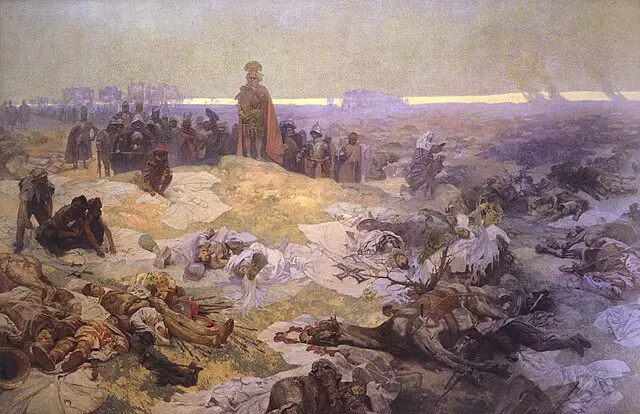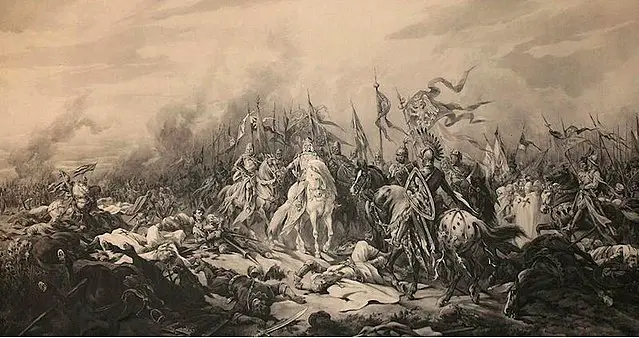It began with a map. A bold one. The kind of map where someone, usually with a crown, draws borders that don’t yet exist. And in the early 1400s, those borders were bleeding red across Eastern Europe.
The Teutonic Knights were a military order originally formed during the Crusades. Think monk-meets-knight with a very sharp sword. By the 15th century, they had carved out their own state along the Baltic Sea. Ruthless, well-organized, and heavily armed, they were feared across Europe. But like all empires that grow too confident, they eventually made a mistake.
They picked a fight with Poland.
Trouble Brews in the North
In the late 1300s, the Kingdom of Poland and the Grand Duchy of Lithuania did something nobody expected. They teamed up. Through a royal marriage, the two powers formed a powerful alliance against common enemies. On paper, it looked awkward. Lithuania was still largely pagan; Poland was proudly Catholic. But on the battlefield? They were terrifyingly effective.
The Teutonic Knights hated this union. It undermined their reason for existing. They were supposed to Christianize the pagan lands. If Lithuania became Christian through diplomacy, then what was the point of all those swords?
In 1409, a rebellion broke out in a Teutonic-controlled region called Samogitia. Lithuania supported the rebels. The Teutonic Order declared war. Poland backed Lithuania. And just like that, the stage was set for one of medieval Europe’s most epic battles.

Enter the Battlefield: Grunwald, 1410
July 15, 1410. The fields of Grunwald, in what is now Poland. It was summer, but not the kind of summer you picnic through. The Polish-Lithuanian army, led by King Władysław II Jagiełło and Grand Duke Vytautas, faced off against Grand Master Ulrich von Jungingen and his Teutonic elite.
Estimates vary, but we’re talking tens of thousands on each side. Soldiers, archers, cavalry. Imagine the dust, the heat, the sheer chaos.
The Teutonic Order was confident. Maybe too confident. They believed themselves tactically superior, militarily elite, even divinely favored. What they didn’t expect was how cleverly their enemies had planned this.
The Feint and the Fury
Early in the battle, the Lithuanian forces seemed to retreat. The Teutonic knights pursued them, believing they’d already broken one of the enemy’s main lines.
But it was a trick.
The Lithuanians wheeled around and struck from the flank. At the same time, Polish forces surged forward. Surrounded and caught off-guard, the Teutonic army began to collapse.
By the end of the day, much of their leadership lay dead. Grand Master Ulrich was among the fallen. It was a disaster for the Order. They had underestimated the unity and cunning of their opponents.
So… Did Poland Win the War?
Yes and no.
The Battle of Grunwald was a massive victory. It shattered the Teutonic aura of invincibility. But Poland and Lithuania didn’t go straight for the kill. Instead of marching on the Teutonic capital of Marienburg immediately, they hesitated.
The Teutonic Order regrouped. With help from mercenaries and allies, they held their capital and negotiated peace.
In 1411, the Peace of Thorn was signed. Poland and Lithuania got some land back, but not as much as you’d expect after such a big win.
Still, the psychological damage to the Teutonic Knights was done. They began a slow, steady decline. Their state weakened. Their reputation faded. By the end of the 15th century, they were a shadow of their former self.
Why It Still Matters
The Battle of Grunwald, and the war that surrounded it, was a turning point in Eastern European history. It marked the rise of the Polish-Lithuanian alliance as a major regional power. And it exposed the limits of theocratic military orders in a world that was slowly shifting toward diplomacy, dynastic alliances, and national identity.
It’s also just a great underdog story.
Poland and Lithuania were not supposed to win. Not against one of the most disciplined and feared military orders in Europe. But they did, through brains, unity, and a bit of battlefield theatrics.
One Last Thought
History loves clear winners and losers. But the Teutonic defeat wasn’t instant. It was more like a crack forming in marble. One bold strike, and the whole thing eventually falls apart.
Grunwald was that strike.
Even today, the memory of that battle holds a strange, powerful weight in Poland. Statues commemorate it. Streets are named after it. It was more than just a military victory. It was a moment of pride, unity, and yes, cleverness.
Because sometimes, to bring down a giant, you don’t need to be bigger. You just need to know when he’s overreaching.
Sources:
1. historyhit.com – Facts About the Teutonic Order
2. Britannica – Battle of Grunwald

